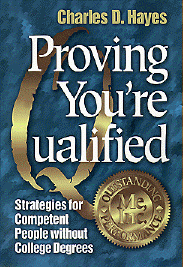|

PROVING
YOU'RE QUALIFIED:
| Strategies for Competent People
without College Degrees.
Read Proving You're Qualified
and:
-
Find a better job or get promoted--with
or without a college degree.
-
Leapfrog ahead of coworkers with
better credentials.
-
Know more about career advancement
than your boss.
|

Proving You're Qualified
Charles D. Hayes
|

Reviews and
Comments:
| "Deserves
a place on the sociology shelf." |
| Library
Journal |
| "An
unusual, excellent approach to ensuring job security." |
| The
Bookwatch |
| "For
more than twenty years, I have been writing about the disparity
between learning and credentials. I show people with skills but
no credentials how to earn the degree that will open doors for
them. Now comes the perfect complement to that work. Charles
Hayes' wonderful Proving You're Qualified, shows
people with skills but few credentials how to parlay their
skills into employment and acceptance without benefit of
degrees." |
John
Bear, Ph.D., author of Bear's Guide To Non-Traditional
College Degrees.
|
| "A
superb editorial analysis of
a basic part of an aging educational system that needs some
radical changes. This book should be studied by all of those who
accept responsibility as facilitators,
assessors or credentialers
of learning." |
Urban
Whitaker, Ph.D., author of Assessing Learning:
Standards, Principles and Procedures.
|
| "This
is the wisest and most useful book I have ever read on this
subject. Anyone smart enough to have gained knowledge and skills
on their own will be able to get recognition and advancement
using the powerful strategies offered by Charles Hayes." |
Ronald
Gross, author of Peak Learning and The Independent
Scholar's Handbook.
|
| "Proving
You're Qualified is like a mystery novel. I couldn't put it
down. It's a page turner so compelling you feel forced to write
comments on the side of the pages as you go along. If you would
like to have the confidence of a guide who has been there, and
who can show the way to realize closure, this may be the most
important book you ever read." |
James
R. Fisher, Jr., Ph.D., author of The Worker Alone!
Going Against The Grain and
Work Without Managers: A View From The Trenches. |
-
 Chapter
One: Chapter
One:
Changing the Focus to Outstanding Performance
- Merit and achievement
Professionalism: Knowledge as a Franchise
Decredentialing Society
- Chapter Two:
Understanding What You Are Up Against
- The Dynamics of Pyramid
Power
Times are Definitely Changing
- Chapter Three:
Understanding Management
- The Changing Face of
Management
Individual Performance Reviews
Promotions
- Chapter Four:
Understanding Credentialing Methods
- Guilds and Professional
Associations
The Psychology of Commitment
Registration, Certification, Licensure
Grades, Testing, and Success
- Chapter Five:
Who is Really Qualified?
- Education and Credentials
Competence
Motivation and the Big Misunderstanding
Communication: The Universal Credential
- Chapter Six:
Leverage, Options, and Choices
- Self-Knowledge: The Greatest
Leverage You Have
Capitalizing on Strengths
Learning with a Purpose
- Chapter Seven:
Learning to Live with Change
- The Nature of Change
The Future of Work
Chaos and the Future
- Chapter Eight:
Me, Inc.
- The Learning Organization
and the Learning Individual
The Me, Inc., Philosophy
Changing Minds
Author Remarks
My writing has two objectives: the first is to help self-educated
people with solid work experience earn more money and find satisfying
work. The second is to help people realize that self-education is, in
itself, a key to a richer, more satisfying life.
There are two types of people with valuable work experience, but no
college degree. Those in the first group are forever apologizing about
their lack of formal credentials. Those in the second group demonstrate
their knowledge and experience through outstanding performance and
render ridiculous any attempt to question their credentials. The first
type of person lives a lifetime of regret. The second lives life to its
fullest. The choice is yours.
Henry David Thoreau said most people live lives "of quiet
desperation." This goes double for people who are insecure about
their lack of formal education.
After more than thirty years of working in a wide range of
occupations, I speak from practical experience. I am self-educated, I
have no college credentials, and yet I have often been hired and
promoted ahead of individuals with college degrees. I am retired from a
major oil company, and yet, they still call me for special assignments.
College degrees often mean higher earning power. No doubt about it.
But degrees are not more important than the knowledge they are supposed
to represent. Today's economic reality will acknowledge
learning--regardless of how it is acquired--if you know how to present
yourself.
|